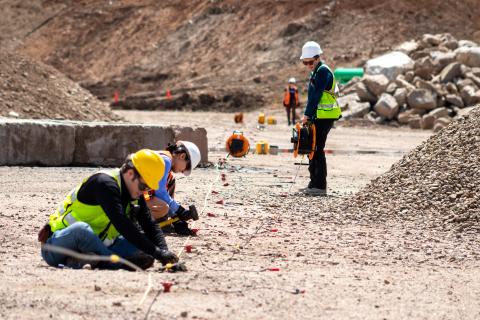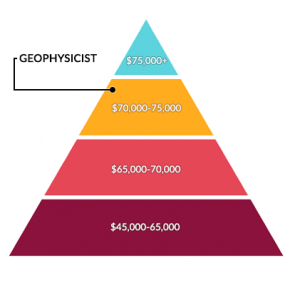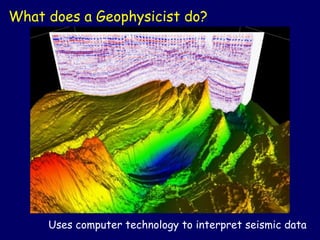All Categories
Featured
Table of Contents
Geophysical Consulting in Innaloo Australia 2022
This work is progressively contracted out, so consultancies provide another source of work. Consultancy firms vary in size, from very little companies to large multinationals. Some consultancies are rather specialised in utilizing specific geophysical methods or working in particular locations, while others provide a more varied series of services to their clients.
The extraction of gas from land fill websites is another area of work and this might grow in the future. Exploration business may carry out work for construction companies, water business, mining companies and ecological firms, so geophysicists may be employed in any of these settings. Other employers consist of: geological surveysgovernment bodies and agenciesuniversities and research institutes.


Jobs might be noted in the oil and gas sector press. Recruitment is impacted by oil cost fluctuations and the level of competition for positions varies depending upon this. Professions Days, which cover the full variety of geoscience professions and are usually participated in by a variety of key industry employers, are run by The Geological Society.
Geophysical Survey Flashcards in South Lake WA 2022
Some of the large oil and gas business provide a complete two-year structured training programme across the breadth of geophysics, consisting of the chance to experience operate in numerous teams before specialising in one location. Your training might include deal with: existing wellsmagnetic and gravitational prospective field data analysisresearchrock analysis. However, it's more typical for your initial training to be supplied on the job.

There might be a probationary duration during which you work alongside a knowledgeable associate. Competency-based appraisals occur frequently in most companies. In smaller sized firms, and for academic posts, there is unlikely to be any formal training - you'll be anticipated to start work straightaway and get skills as you go along.
If you work for a smaller company, you might discover that you need to take duty for setting up and moneying your own advancement and training. If you have a geology degree, membership of The Geological Society can be useful for networking and for maintaining to date with the industry.
Geophysical Survey Services - Geophysical Test Methods in West Perth Oz 2021
You might likewise discover it useful to sign up with the PESGB (The Petroleum Exploration Society of Great Britain, which has a geophysics unique interest group. After a probationary period, and when you've gained some experience, you could progress to senior geophysicist, then team leader and then into a senior role in management.
The ease of motion between roles depends on the business structure. Research study at Masters or Ph, D level in a subject related to geophysics or geosciences might aid with your career development and progression. The employment market within the oil and gas market is extremely based on rate and this may impact your opportunities for career progression.
Nevertheless, not all jobs are dependent on the oil and gas markets. For skilled geophysicists, freelance consultancy provides a great route for career advancement. You can likewise specialise in a particular area of geophysics. As a geophysicist, you're most likely to have numerous jobs throughout your working life. Worldwide mobility is important for dealing with peaks and troughs in various countries at various times.
Geophysics Jobs in Rossmoyne Aus 2021
From geophysics, it's possible to concentrate on seismology (completing additional training to end up being a seismic interpreter) or to move into associated areas such as engineering geology or risk prediction.
Deciding what to study in college is a hard option. Even if you understand that your field of interest lies in science, what program of study is ideal for you? If you make the choice to major in physical and biological sciences and pursue a career as a geophysicist, you're preparing for an exciting and profitable occupation.
The first action to accomplishing your goal of becoming a geophysicist is making a degree. Even for entry-level positions in the field of geoscience, you'll require a bachelor's degree (a geophysicist college degree) from an accredited college or university. Some research study positions need prospects to hold master's degrees and even Ph.
Definition: Geophysical Survey in Hocking Western Australia 2022
Doctoral degrees are especially essential if you prepare to teach at a four-year institution. Geophysicists use physics concepts and methods to study the gravitational, magnetic, and electrical fields of the earth. This advances researchers' understanding of both the planet's interior core and its surface area. Geophysicists need to have the ability to: examine rocks, photographs, and other pieces of information conduct research both in the field and in labs produce maps and charts of their findings write reports To accomplish all this, students need a specialized education for geophysicist professions.
As mentioned above, you'll require a bachelor's degree in geoscience or an associated discipline, such as a physical science or a natural science, to land an entry-level job. But trainees can also prepare by learning subjects like: Biology Chemistry Computer technology Engineering Mathematics Physics The above geophysicist majors offer a more generalized method to a single scientific discipline, however the majority of programs require trainees to take one or more geology course.
Latest Posts
Geophysicist Job Description in Guildford Aus 2023
Marine Geophysical Surveying - in Maddington Aus 2023
Geophysical Survey - Suffolk Heritage Explorer in Millendon WA 2023